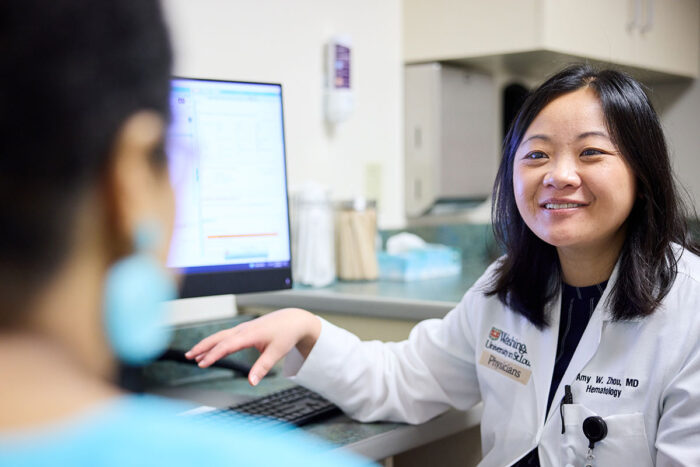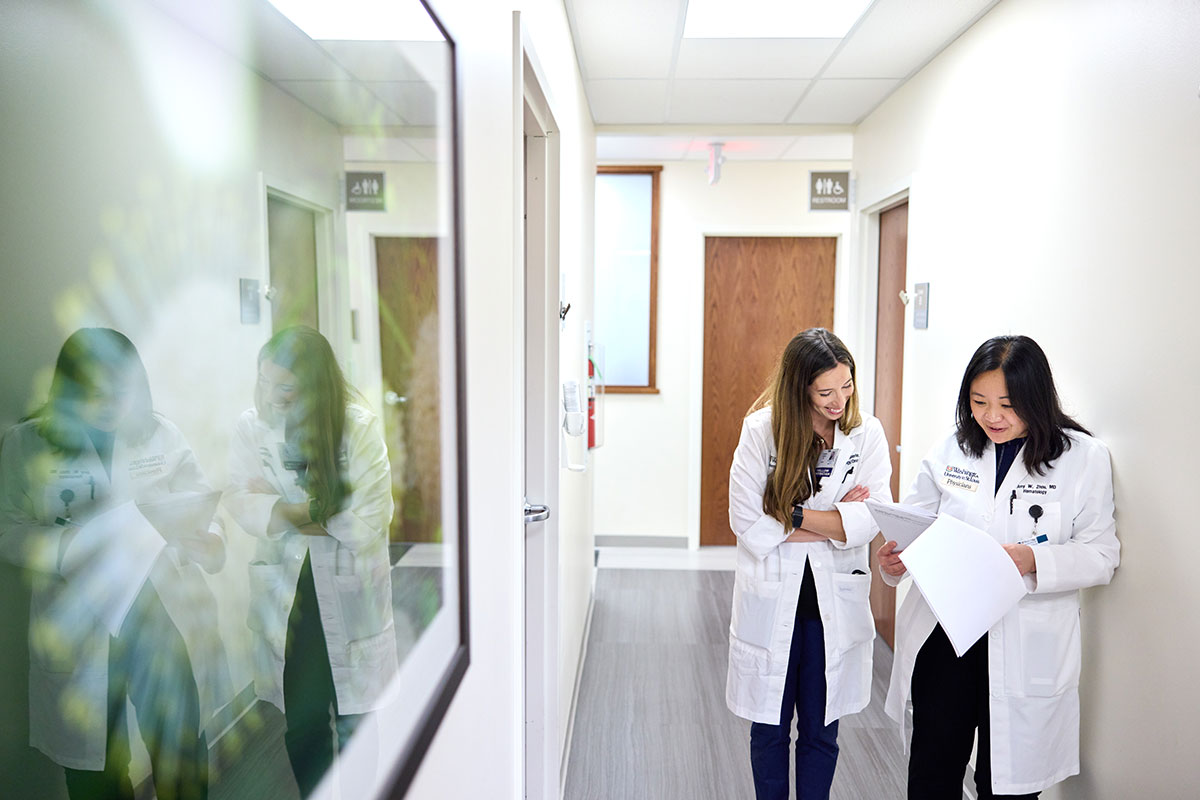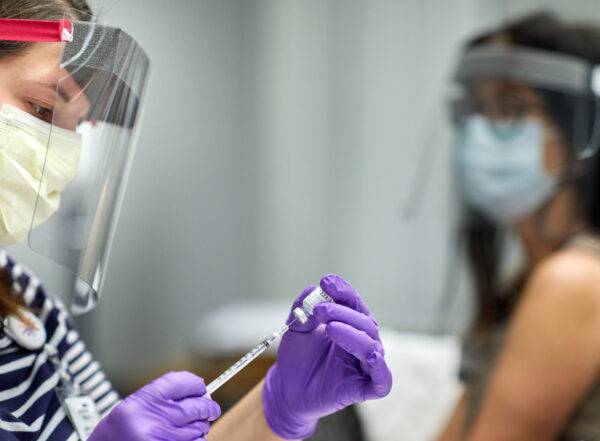Washington People: Amy Zhou
Hematologist values connections with patients, pursues research to improve treatments
 Matt Miller
Matt MillerAmy Zhou, MD, a hematologist at Washington University School of Medicine in St. Louis, sees a patient at Siteman Cancer Center's West County facility in Creve Coeur. Zhou treats patients with various blood disorders and conducts clinical trials investigating possible new therapies for such patients.
Growing up in Detroit as the daughter of two engineers, Amy Zhou was good at math and programming and wondered if engineering also might be the right career for her. But on “Take your Daughter to Work Day,” Zhou had an important realization.
She remembers touring the automotive supply company where her father designed car steering systems. As she walked the factory floor, Zhou found the work a bit secluded, so she began thinking about careers that might offer more opportunities to interact with people. Later, a high school anatomy class piqued her interest in medicine.
“I’ve always really enjoyed meeting and talking with people,” said Zhou, MD, now an associate professor of hematology at Washington University School of Medicine in St. Louis. “As a clinician, I feel like my job is never boring, because I get to interact with so many different people every day and develop long-term relationships with my patients.”
Zhou’s specialty is blood cancers, particularly myeloproliferative neoplasms (MPNs), a set of conditions in which the body produces too many blood cells — sometimes red blood cells, other times white blood cells, sometimes platelets, or a combination. The conditions cause a wide range of symptoms, including headaches, fatigue, itching, pain and weight loss in addition to affecting normal blood production and increasing the risk of blood clots. In some cases, MPNs can progress to more aggressive and life-threatening blood cancers.
As a hematologist, Zhou — who treats patients at Siteman Cancer Center, based at Barnes-Jewish Hospital and Washington University School of Medicine — is involved in clinical trials aiming to find better therapies for patients with such conditions.
“There’s a big need for better therapies, especially for patients with a type of MPN called myelofibrosis,” Zhou said. “Of the MPNs, myelofibrosis has the highest risk of leading to acute leukemia. The prognosis isn’t great, and treatment options are very limited. Recently we’re seeing more therapies that have been approved and more in the pipeline, and it’s important to me to be a part of improving treatment for these patients.”
MPNs are the primary focus of Zhou’s clinical research, but she regularly sees a variety of patients with hematologic disorders, from iron deficiencies to blood cancers.
 Matt Miller
Matt MillerZhou earned a bachelor’s degree in cell molecular biology and anthropology/zoology in 2005 from the University of Michigan in Ann Arbor, Mich., and her medical degree in 2009 from Wayne State University School of Medicine in Detroit. She completed her residency in internal medicine at hospitals affiliated with Emory University School of Medicine, including Atlanta’s Emory University Hospital and Grady Memorial Hospital in 2012, and a fellowship in hematology and oncology through Washington University before joining the School of Medicine faculty in 2016.
Zhou discussed her life and career in medicine, as well as her motivations for working with blood cancers:
How did you become interested in hematology?
I don’t think I seriously considered a career in medicine until high school, but it was as simple as doing well in an anatomy class in high school that led me to choose medicine. I became interested in hematology during my rotation with some of the hematologists at Wayne State University in Detroit, and they were great teachers. And I just really enjoyed reviewing blood smears — blood tests where we look for abnormal blood cells under a microscope. I thought it was really cool. There’s a lot of clinical problem-solving that goes into hematology, which is just a lot of fun.
What are the limitations of current MPN treatments?
I think the biggest limitation is that most of the treatments are not curative. A lot of our treatments manage the complications or the symptoms, but how long the benefits of the treatments last is variable. The only curative treatment for many of these blood cancers is stem cell transplantation, which can be associated with risks and side effects. Also, not every patient can get a transplant because of age or other health problems. This is why it’s so important to have research in this area.
What is the most challenging part of being a physician? And what part of your career do you enjoy most?
One of the biggest challenges for me is having limited treatments available. For every patient who comes in, I wish I could just give them a shot of a drug and they would be cured and never have to see me again. But the fact that we’re not there yet is very challenging, because you realize the limitations, and you wish you could provide more.
I enjoy interacting with my patients the most. Because of the continuity that comes with treating a cancer such as MPN, I get to build a rapport with my patients throughout their treatment process. It’s very nice to be able to establish ongoing relationships, and I get to hear about other aspects of their lives, like what they do and how their families are doing.
What would you choose to do if you weren’t a doctor?
In my fantasy job, I would have a hobby farm and a homestead, and I would grow all my own vegetables and have chickens and a mini donkey. I got into gardening a few years ago as my pandemic hobby, and I really enjoy it, but I call it my fantasy life because I do not think that I would be able to grow vegetables to sustain myself and my family. Realistically, I think I would probably still be doing something health-care related. If I hadn’t gone to medical school, I probably would have gone into public health and maybe done something in toxicology or parasitology, which I have always found interesting.
Can you tell us a little bit about your family?
My husband, Ryan Guffey, MD, is an associate professor of anesthesiology here at Washington University. We met in medical school at Wayne State, did residency together at Emory and both decided to come to WashU because of the opportunities offered here. Our first baby was our dog, Chewey. He was 13 years old and passed away last year, which was a difficult loss. We have two children, Alexander and Colin. Alexander is 5, and Colin is 3½, and they can be quite a handful.







